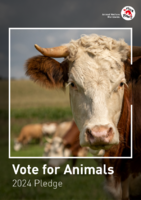Billions of animals in the European Union suffer due to a lack of protection and a failure of the EU to act. The laws that protect these animals will be rewritten, and we now have the opportunity to choose who will shape them. It is time to fix the appalling conditions in which farm animals are kept, transported and slaughtered, to end the cruel puppy trade, to ban fur farming and to end the commercial and illegal trade of wild animals.
The next European elections will be held 6th – 9th June 2024. Prior to this we urge EU citizens to use your voice to help shape the future of animals in Europe. Tell candidates in the elections to the European Parliament that animal welfare matters to you and encourage them to pledge to protect animals.



